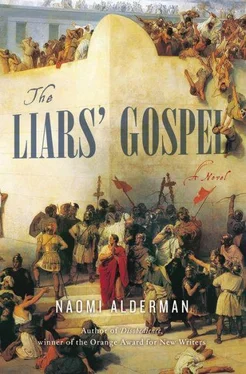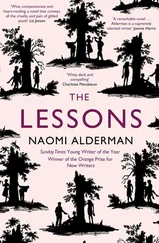And while he tells this liar’s tale, Iehuda reminds himself of how it really was. He does this every time, although it pains him, because he must know it, if only in his heart.
He had been so holy and abstemious that no Roman would believe it. His father had died when he was a boy. He had worked the farm, and attended the Temple on holy days, and cared for his mother and his two younger sisters, and only when they were fed, and wed, did he think of himself. He was a boy who loved the Lord too much, if such there is. Loved Him too much and thought of Him too much, and wanted only to do His will and know His words. The days in Jerusalem for the three festivals were his only respite from work, and they were joyous indeed, for then he was close to the place where God lived. And when he married — yes, at twenty-eight, and yes, a virgin, and yes, this had not seemed a special hardship to him — a thoughtful and hardworking and quiet man, when he lay with his wife that first time he thought of the deed as much a joining with God as with the shrewd and lusty woman, Elkannah, who had consented to marry him.
She worked in the fields by his side and spun wool and wove cloth and baked bread, and he felt lucky past imagining — though he was too serious a man ever to be freely joyful. His beard was long and full, though Elkannah used to sit astride him on the bed and trim it with the knife when he let her. He still remembers the curve of her behind and how neatly it fitted into his two cupped palms, and how his cock would rise to meet her while she wriggled on his lap and laughed and told him to hold still or she would end by stabbing him with this knife and who then would provide for her and the children they would surely have, would he think about that?
But when he was twenty-nine a hard fever passed through the village of Qeriot. It had been a long hot spring when they were taken down and water was short in the mountain streams. Only the well gave a good supply and some days they were too weak to lift and turn the bucket. It was a blinding fever, putting black spots in front of the eyes and then making it too painful to look out in full sunlight. But it was his fault, he knew, even though he had been as sick as her. He should have found a way to get water.
On the third day, he managed to leave his bed to walk to the well. He tottered like a newborn lamb all the way there and all the way back, with the black spots hovering at the edges of his sight, but when he brought back the water Elkannah was dead. Quiet in the bed, as if she had slipped out between one breath and the next. As if she had simply forgotten to take that next breath and might remember in a moment, wipe her hands on her apron, chide herself for her foolishness. But she was gone.
And then something else was gone, suddenly and without his consent.
It was not the sweet soft scent of his wife in bed in the mornings that he missed the most — though he missed her beyond enduring. He missed most the God who he had always felt watching over him, who in quiet moments he would speak to and imagine that he heard a comforting response. Who he had wept to on long nights after his father had died and who had placed a hand upon his neck and said, “I am your Father in heaven, and I shall give you strength.” He felt that the line joining him to heaven — like the cord that connects a baby to its mother — had been severed. Perhaps the Father was still there, but Iehuda’s face was turned so far away that he could not tell any longer.
He thinks now that it may have been a crime to feel as he did. To mourn for a God more than for a wife? But it is so.
Some time passed, but he did not measure it. A handful of seasons, and he worked still just the same, because what else was there to do, and the people of the village — who had themselves lost parents and children, spouses and siblings — said to themselves, “Before long he will take another wife, he will have sons and daughters and forget this first one.” They did not know that his heart was as cold as the earth and as empty as a dry wheat husk.
And then the man came to the village. Iehuda had heard nothing of him. The decision to go and listen to him speak was merely the choice between a long night alone in his home and sitting with the people to hear whatever foolishness they would hear. He had seen dozens of such preachers over the years, he and Elkannah had gone to listen to them sometimes and joked over their prattle or, occasionally, debated their wisdom.
This man had not been so much different, at first. Telling tales to illustrate his messages, talking about God’s love. At a certain point, he fell silent. Sifted the earth with his hand. Rubbed his forehead. Looked up, as if searching through the crowd, and with his eyes found Iehuda, and he held the gaze, and held it, and Iehuda could not look away.
“You are looking for God,” said the preacher, “but God is also looking for you. And He will find you. He has found you tonight.”
And Iehuda felt tears starting in his eyes.
“You have lost much.” The man spoke in a level tone, neither emphasizing nor attempting to persuade. He spoke as if he were hearing the simple truth from heaven.
“God has felt your loss,” he said, “and He has not forgotten you, although you have turned your face away from Him. He speaks to you today as a Father. Tell me whom you have lost.”
This was no secret. Any child in the street could have told him that Qeriot had been struck by the sickness. Every person had lost something.
Iehuda said, “My wife.” It was defiant, the way he said it. Challenging the man to impress him.
“And your father?”
It was a lucky guess, Iehuda told himself, nothing more, a guess from a preacher. How many men of thirty have not lost their fathers? The man could not have known that he had lost him especially young, that he had taken it especially hard.
But still he said, “Yes.”
And the man, whose name was Yehoshuah, unfolded his long limbs and stood up from the earth and walked over to Iehuda and gave him a hand to lift him up. He put his hands on Iehuda’s shoulders and said, “You think that your Father in heaven has forgotten you. But your Father in heaven is here. Now. Guiding me to you today. Listen,” he said, “this story is for you.”
And he told a story to the crowd.
There was once a man who had two sons. And because he had business both near and far, he sent one of his sons to do all his commerce in the city and kept one by him to learn the ways of the farm. That son who was sent away burned with rage, for he was kept from those he loved, and from his father. He sent angry letters back to his father, begging him to let him return, but the father left him there for ten long years, while his brother raised a family, and lived at home, and tended the fields. At last, after many years, the father brought the son home from the city.
“Father,” said the son, “why did you keep me away so long?”
And the father said, “My beloved son, you were always on my business, every moment you were away. And now that you have come to understand all my doings, this farm and all that is in it is yours.”
“So it is,” said Yehoshuah, “with men. It is those who suffer who will inherit the kingdom of heaven, and our Father in heaven has already picked out a golden seat for you, my friend. He loves you best of all.”
The man moved on with his talking and preaching. But it was as though Iehuda had been struck by lightning through the top of his head and into the ground, because he wanted it so much to be true. Not like Job’s suffering, a test. But as this man had said, a gift.
That night the man made camp near to the brook, with a small fire and some gifts of food for his trouble and three of his friends, for few men followed him then. Iehuda, with about eight or nine others from the village, sat with them in their camp and listened to them talk.
Читать дальше












